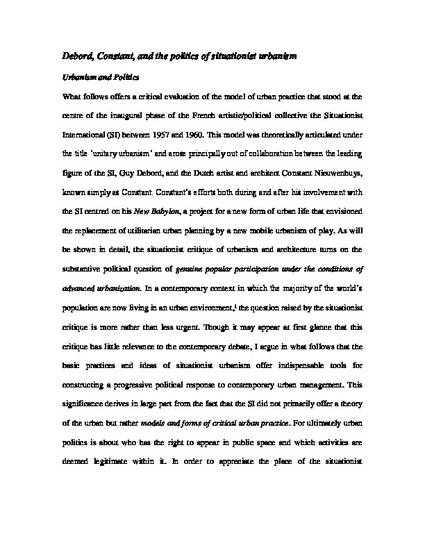
- Avant-garde (Aesthetics) -- Europe -- History -- 20th century,
- Architecture -- Philosophy
In the first years of its existence between 1957 and 1960 the efforts of the radical collective the Situationist International (SI) centred on its program of "unitary urbanism." This program sought to challenge the functionalist character of hegemonic forms of urban planning through novel practices of urban experimentation and contestation. Situationist urbanism arose largely through the collaboration between Guy Debord and the Dutch avant-garde architect Constant. This article explores the political dimension of situationist urbanism and the tensions that led to Constant’s secession from the group in 1960. Through analysis of the affinities and divergences between urbanism in its modernist and situationist forms a case is made for the crucial contribution situationist practices might make to the restoration of public space as a vital arena of contemporary political contestation and community.
Available at: http://works.bepress.com/brian-elliott/9/

This is the non-formatted version of the article as submitted to Radical Philosophy Review. Changes resulting from the publishing process, such as peer review, editing, corrections, structural formatting, and other quality control mechanisms may not be reflected in this document. Changes may have been made to this work since it was submitted for publication. A definitive version was subsequently published in Radical Philosophy Review, Volume 12 issue 1/2 and can be found online at: https://www.pdcnet.org/pdc/bvdb.nsf/journal?openform&journal=pdc_radphilrev
*At the time of publication Brian Elliott was affiliated with the University of Oregon